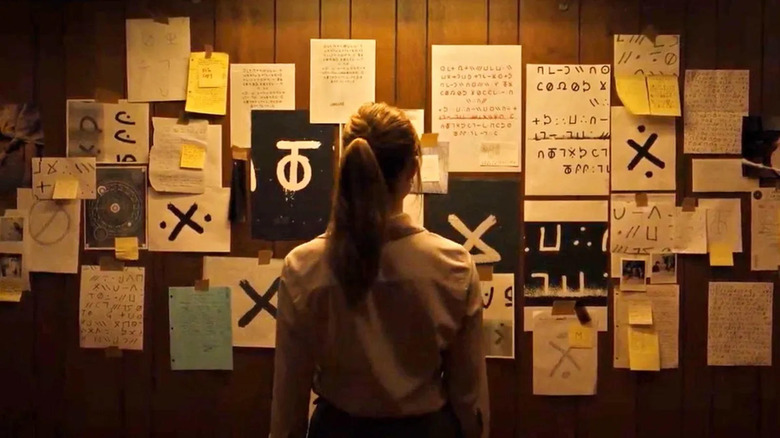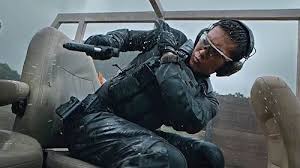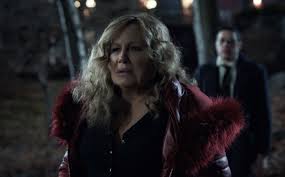Longlegs 2024 Movie Review
As with their online cousins liminal spaces, “cursed images” take the mundane and turn it sinister by highlighting the dark voids on the edges of our reality. Longlegs, the latest film from The Blackcoat’s Daughter director Osgood Perkins, calibrates its horror similarly, twisting familiar genre elements to give them an aura of interdimensional evil. In his version of a serial-killer thriller, Perkins combines the grisly realism of a crime-scene photograph with the startling surreality of a nightmare. The result feels taboo, like something we shouldn’t be looking at and may suffer consequences for seeing.
This diabolical impression comes across strongly at the beginning of the film. After an opening sequence that’s like a vintage home movie until it suddenly, terrifyingly, isn’t, Perkins establishes a link between true-crime aesthetics and psychic woo-woo with the introduction of rookie FBI agent Lee Harker (Maika Monroe). While out searching a featureless suburban neighborhood with her partner, Agent Harker suddenly has a strong intuition that their suspect is hiding out in a random house. To the surprise of everyone — except for the audience — she’s right.
And so her boss, Agent Carter (Blair Underwood), tasks Lee with investigating a baffling group of crimes. A series of nice suburban households have been wiped out, in what appear to be textbook “family annihilator” scenarios. (It’s a dark theme, even for a murder mystery.) The evidence points to murder-suicide, except for one bizarre detail: Although there are no signs of forced entry — or indeed, of outsiders accessing the house at all — a letter, written in code and signed “Longlegs,” was found at each of the crime scenes. If no one broke in before, during, or after the killings, how did these messages make their way into these homes?
Carter suspects that this “Longlegs” is influencing the killers from afar, which is why he’s bringing Harker and her newly discovered abilities onto the case. “He tells them what to do to themselves, to each other, and they do it,” he says. Longlegs’ messages are designed to resemble those of the Zodiac Killer, and the agents bring up Charles Manson when discussing his methods. Weaving these historical crimes into a work of occult fiction blurs the line between real and unreal, and is key to the film’s uncanny power.
Perkins creates an additional destabilizing influence by subjecting Lee – and, by extension, us – to a slideshow of (staged) autopsy photos accompanied by recordings of (staged) 911 calls as Carter explains the implications of these crimes to his psychic protegé. These brief flashes of gore and mutilation are reinforced by a recurring blood-splatter motif, as well as subliminal cut-ins of demonic imagery in shades of red and black. Perkins’ screenplay also cleverly repeats unnervingly childlike phrases – “big bad wolf,” “nasty stuff” – to hypnotic effect.
Lee dives into this bloody mystery feet first, and the tension builds as she realizes that not only does Longlegs know her name and where she lives, but they met once, a long time ago. This is where the film becomes Perkins’ take on The Silence of the Lambs, with Monroe as the Clarice Starling of the piece. When we finally meet Longlegs (Nicolas Cage), he’s Buffalo Bill’s Satanic cousin, with the makeup and the glam rock but without the problematic trans storyline. Instead, Cage does his version of warbly-voiced weirdo crooner Tiny Tim – an affectation that would be bonkers coming from anyone else, but is just another day at work for Cage.
Monroe, meanwhile, is capable and brave in the role of Agent Lee Harker, particularly opposite Alicia Witt as Lee’s fragile mom, Ruth. She can’t quite maintain the center of gravity needed to keep Longlegs from spinning out as the conspiracy gets deeper and the murder methods more esoteric. But she does have a lean athleticism that makes you believe she’ll survive until the end, a quality that’s seen her cast as a “final girl” in films like It Follows, The Guest, and Watcher. The term doesn’t quite apply here; this is a procedural, not a slasher movie. But the spirit is the same.
Perkins also has a strong sense of identity as a filmmaker, and his overcast color palette and American Gothic farmhouse aesthetic carry over here from The Blackcoat’s Daughter and I Am the Pretty Thing That Lives in the House. There’s no mistaking that this is his work, even when it resembles someone else’s. There are moments when Longlegs feels like a movie you’ve seen before, but with an evil filter laid over it: This is both a weakness and a strength, as Perkins’ horror surrealism renders the familiar strange, and the strange familiar. That leaves us, the viewers, vulnerable – the perfect opportunity for something unholy to creep in.
Director Osgood Perkins brings his signature style to a serial-killer procedural that combines grisly true-crime aesthetics and uncanny Satanic horror. It Follows’ Maika Monroe stars as a plucky FBI agent in the Clarice Starling mold, with Nicolas Cage as her Buffalo Bill – as only Cage could (or would) play the role. Supernatural elements alter our sense of reality, making it feel like something evil is emanating from the movie itself.




